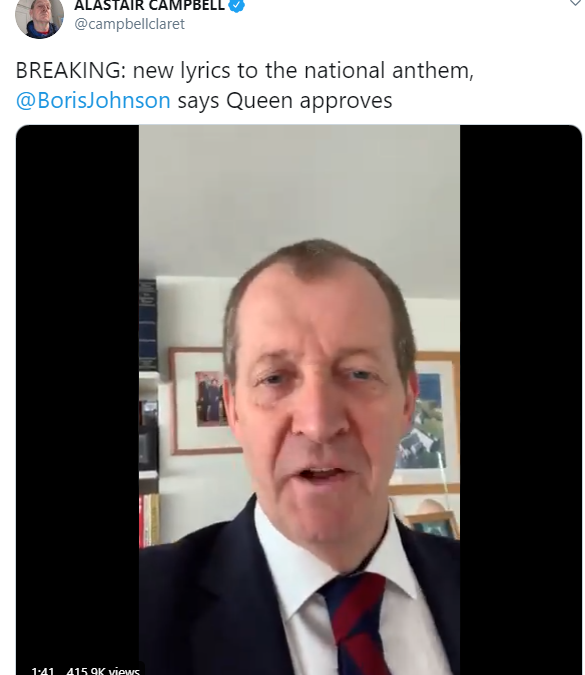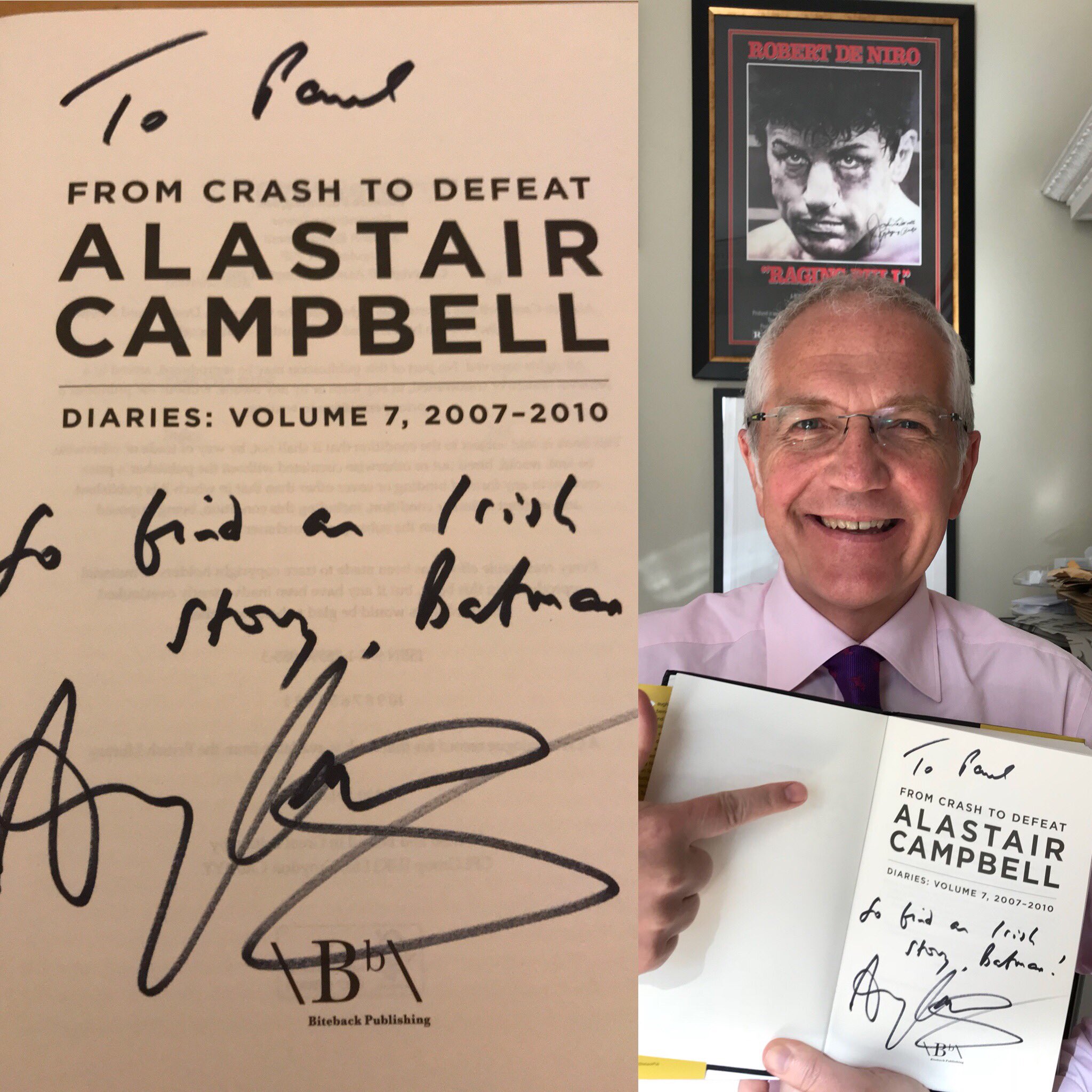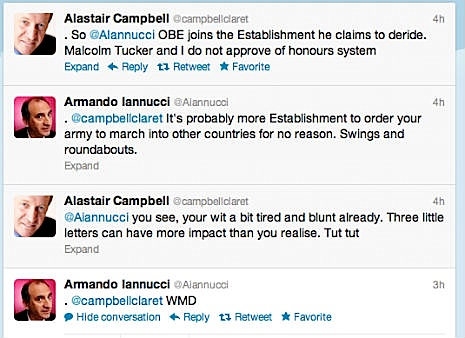Alastair Campbell has always struggled with depression. In a deeply personal book, he reveals the impact it’s had on him and his family – and how he’s been able to survive it. Reply on Twitter 556673026 Retweet on Twitter 556673026 1 Like on Twitter 556673026 11 Twitter 556673026 '; ALASTAIR CAMPBELL @campbellclaret 1h 424988672.
- Alastair Campbell Twitter
- Alastair Campbell Twitter Images
- Julia Hartley Brewer Alastair Campbell Twitter
The former Downing Street communications chief is incensed about the state of politics and the media

Alastair Campbell has sat at the side of power. The former Downing Street director of communications under Tony Blair is one of the most famous, and perhaps infamous, advisors and confidants in modern British politics. He was a mainstay of the New Labour years, even credited with coining the term, steering its leaders and marshalling the media over its 13 years in office.
No one knows the game better. Campbell knows how the political system operates, the rules of engagement and the limits of Britain’s vague, unwritten constitution.
And he knows things aren’t supposed to be like this.
“I feel like we’re living in a kind of really bizarre fantasy world,” he told me, in an interview for Byline TV. “You see politics driven by the myth.”
Campbell belongs to the Westminster hall of fame and is typically portrayed as a card-carrying member of the establishment. But, while his phonebook boasts the digits of world leaders, he harbours barely-concealed rage towards the current mainstream and the media he once belonged to.
“Something very strange has happened to our political-media ecosystem… lies aren’t called out, scandals are not seen as scandals,” he said. “For all the new media stuff that’s around, the old media – the kind of oligarchical, right-wing owned media – they want a right-wing government, they want a right-wing Prime Minister, and therefore they don’t call [Boris Johnson] out.”
Before entering Blair’s court in 1994, Campbell was a Fleet Street hack – working as the political editor of the Daily Mirror, among other roles. Indeed, he seemed to take particular pleasure in sifting through the latest edition of Byline Times before our interview began, pointing out the changes he would make.
Boris Johnson is still ahead in the polls, he says, despite “so many deaths, such a hit to the economy, so many lies, so much corruption in COVID contracts” because people see the pandemic as a war-effort and so believe that they must support the Government as their contribution to the campaign.
But, the Prime Minister’s poll lead is also due to a reverent media, which has forgotten how to investigate those in power. According to Campbell, a pathological impulse to hold power to account has been replaced by a timid benevolence towards the worst Government in modern history.

“It seems to me that, with some exceptions, it is simply not fulfilling the role of a free media in a genuine democracy,” he said. “Now it seems to be, if there’s any suggestion of scandal, if there’s any suggestion of lying, their instinct is not to cover it.
“Most days now, you turn on the radio or the television and it starts with the words ‘Boris Johnson did today’ or ‘Boris Johnson will today’. There’s a symmetry between what the Government wants the media to put out and what the media puts out.”
Yet the media is still feared by Downing Street, even if its impact is stunted. One of the lacerations suffered by Johnson’s administration during the Coronavirus pandemic came in the form of a newspaper exposé – that the Prime Minister’s chief aide Dominic Cummings had travelled 250 miles to County Durham during the first lockdown, after which he took a trip to Barnard Castle to ‘test his eyesight’.
“I went a bit bonkers at the time,” said Campbell, who in many respects served similar functions to Cummings when he occupied Downing Street. He was keen to assert, however, that he certainly was never in the same shoes as Cummings. “I dressed a lot smarter than he did,” Campbell added. “Because I thought you should, if you worked in Downing Street.”
In the Cummings affair, he “saw the corruption of the public space… The use of a massive amount of political capital to defend something that was indefensible. It made me realise that we’re dealing with a Government that doesn’t see the rules as applying to them”.
Brexit Bites
One of the many intersections of impunity and media impotence is Brexit – the issue on which Campbell has campaigned relentlessly in recent years – which he calls the “giant elephant in the room” of British politics.
The Brexit campaign was a watershed moment, he believes, for open deception going unpunished: “Once you’ve won a campaign on lies with no consequence at all, and so many of the papers and the media in general are invested in that, it just extends out to everything else.”
The pollution of politics by barefaced mendacity, legitimised by a pliant press, is second nature to former journalist Boris Johnson – who was sacked from The Times for fabricating quotes. Yet, it’s not an approach that seems to have encumbered the now Prime Minister.
Indeed, this playbook even secured Johnson a comfortable Commons majority in 2019, as he promised that his flawless “oven-ready” Brexit deal would settle the issue for good.
“They don’t really like poor people,” Campbell said. “They don’t like people who didn’t go to the right schools. And I find it incredible that they managed to persuade people to vote first for Brexit and then Johnson as Prime Minister.”
But, as Johnson’s Brexit bluff is exposed by Molotov cocktails on the streets of Belfast and rotting fish in Scottish warehouses, there is a piercing silence from parts of the media and political opposition.
“What is happening in Northern Ireland is dangerous and a consequence, in large part, of the lies that were told on Brexit – and the border in the Irish Sea,” Campbell said. “That is on Johnson’s watch. That is on Michael Gove’s watch, and they’ve got to be pressed on that.”
Peace in Northern Ireland is of particular concern to Campbell, due to the Blair Government’s successful implementation of the Good Friday Agreement in 1998. However, on Brexit and Northern Ireland, the current leader of the Labour Party – Keir Starmer – has left a void, he believes.
“What’s happening in Northern Ireland now needs Labour to be holding the feet of the Government to the fire – not just what they promised and how it led here, but what they’re now going to do about it,” Campbell said. “Labour are almost disabled as a voice, on what is going to be one of the most important issues as the country goes forward… I think it’s dangerous.”


For his part, a protest vote in the 2019 European Elections – plumping for the fiercely anti-Brexit Liberal Democrats – caused Campbell to be kicked out of the Labour Party. He hasn’t reapplied for membership, despite his partisan instincts, and said he enjoys being freed from party loyalties. But he wants “this Government gone”.
Alastair Campbell Twitter
“I think this is the worst Government of my lifetime,” Campbell added. “Labour is the only party I can see is going to get itself into a position of getting rid of them. But right now, today, it’s hard to see it.”
Alastair Campbell Twitter Images
I ended by asking Campbell to recommend one book everyone should be reading right now. “George Orwell – 1984.”
Volume Eight of Alastair Campbell’s diaries is out now, covering the period from 2010 to 2015
Watch Campbell’s full Byline TV interview here
what the papers don’t say
Thank youfor reading this article
New to Byline Times? Find out about us
Our leading investigations include Brexit Bites, Empire & the Culture War, Russian Interference, Coronavirus, Cronyism and Far Right Radicalisation. We also introduce new voices of colour in Our Lives Matter.
Support our journalists
To have an impact, our investigations need an audience.

Julia Hartley Brewer Alastair Campbell Twitter
But emails don’t pay our journalists, and nor do billionaires or intrusive ads. We’re funded by readers’ subscription fees:
